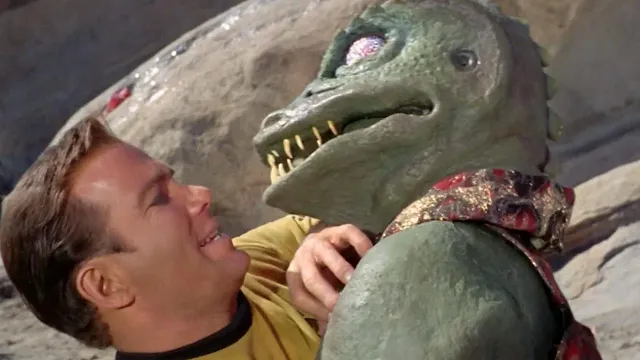Mind Over Might: A Deep Dive into Star Trek's "Arena"
"Arena" stands as one of the most iconic episodes in the storied history of Star Trek. Originally airing on January 19, 1967, and adapted from a short story by Fredric Brown, it encapsulates everything that makes the original series great: the sheer will and resourcefulness of Captain Kirk, a memorable alien adversary in the Gorn, and a battle of wits that transcends simple violence. It’s a classic that remains significant not only for its memorable action but for its lasting impact on the science fiction genre and its thought-provoking exploration of diplomacy and the complexities of understanding one's enemies.
The Setup: Vengeance on Cestus III
The episode begins as the USS Enterprise arrives at the Federation outpost on Cestus III, only to find it utterly destroyed. Evidence points to a brutal, unprovoked ground assault. Consumed by rage, Kirk is hell-bent on pursuing the alien vessel responsible and destroying it for what he perceives as a merciless massacre. Even Spock's logical counsel cannot dissuade his captain's single-minded quest for vengeance. The conflict rapidly escalates as the Enterprise engages the enemy ship, a prelude to a far stranger confrontation.
Suddenly, both ships are stopped dead in space by a vastly superior power. The crew is addressed by the Metrons, non-corporeal and highly advanced beings who view the conflict as primitive. Seeing humanity and the Gorn as equally savage, they declare they will not allow such barbarism in their sector of space. They decree a "trial by combat," transporting Kirk and the Gorn captain to a desolate asteroid to fight to the death. The winner's ship will be spared; the loser's will be destroyed.
The Trial: Intellect vs. Brute Force
On the rocky terrain, Kirk finds himself physically outmatched. The Gorn captain is immensely strong and resilient, while Kirk must rely on his agility. After being injured in a rope trap, Kirk's desperation evolves into determination. He realizes the planet is rich with resources. In a moment of pure inspiration that would make MacGyver proud, Kirk finds bamboo-like reeds, potassium nitrate, sulfur, and chunks of diamond. He resourcefully concocts gunpowder and builds a makeshift cannon.
Just as the relentless Gorn arrives, Kirk fires his improvised weapon, severely wounding the reptilian. He stands poised to deliver the final, fatal blow. But in this moment, Kirk reflects. The Gorn had earlier claimed its attack was an act of self-defense, believing the Federation outpost was an intrusion into their territory and a prelude to invasion. Seeing his enemy helpless, Kirk's desire for revenge is replaced by compassion. He spares the Gorn's life.
Instantly, the Gorn vanishes and a Metron appears. The entity commends Kirk, not for his victory, but for demonstrating the "advanced" trait of mercy. Kirk's decision leads the Metron to observe that humanity, while still savage, shows promise. Kirk finds himself back on the Enterprise, healed, his perspective forever changed. The encounter serves as a pivotal reminder that in the uncharted expanse of space, battles are fought not only with weapons but with ethics and compassion.
Legacy and Impact
"Arena" has left an indelible mark on science fiction. Despite the limitations of the Gorn suit, which actor Bobby Clark had difficulty moving in, the character became an enduring icon. The episode's core conflict has been parodied and paid homage to countless times, most famously in the film "Bill & Ted's Bogus Journey" and a comedic 2013 rematch between William Shatner and a Gorn for a video game advertisement.
The episode's themes are quintessential Star Trek. It challenges the notion of a one-dimensional antagonist, underscoring the importance of empathy and seeking understanding before resorting to violence. Kirk's final act emphasizes the show's consistent message of seeking peaceful resolutions. Furthermore, the concept of a "trial by a godlike being" would become a recurring trope, echoed in later Star Trek series, most notably with the character of Q in "Star Trek: The Next Generation." It was the original two men enter, one man leaves... except, in true Star Trek fashion, two beings leave, both having learned something profound.
Conclusion
"Arena" remains a standout episode that encapsulates the very essence of Star Trek's thought-provoking narratives. Through its exploration of ethics, character dynamics, and the complexities of interstellar relations, the episode continues to captivate audiences. It secured its place within the Star Trek canon by proving that the greatest battles are often fought within oneself, and that true strength is not the power to destroy, but the wisdom to show mercy.
















